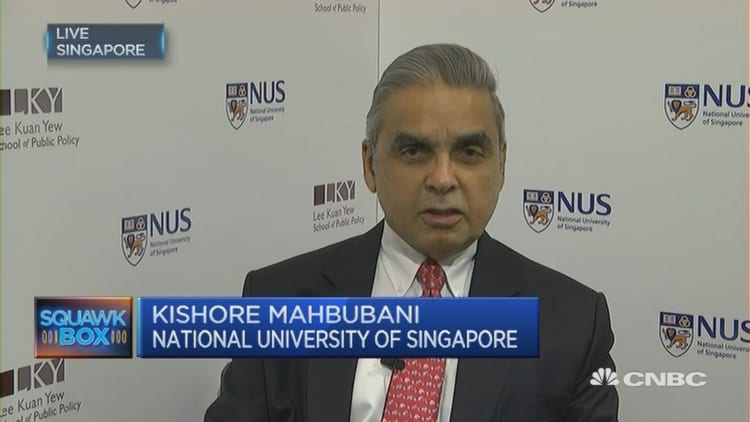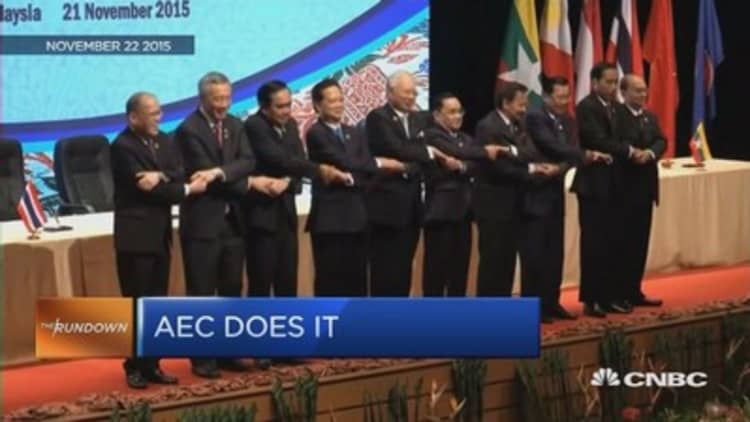It's been a tough year for the Association of Southeast Asian Nations (Asean) as tensions over China's incursions into the South China Sea have challenged its long-running practices.
Asean was originally founded on August 8, 1967, through the signing of the Bangkok Declaration by Indonesia, Malaysia, Singapore, the Philippines and Thailand to promote economic cooperation and regional stability. Brunei, Vietnam, Laos, Myanmar and Cambodia joined later.
The organization has long drawn flak for its adherence to the "Asean way," which entails decision-making by consensus and a non-interventionist approach.
That's dented its ability to respond forcefully to tensions in the South China Sea. China has claimed almost all of the South China Sea, a massive body of water that stretches about 1,200 miles from the Chinese mainland; many countries have objected to those claims. Malaysia, the Philippines, Vietnam, Brunei and Indonesia all claim territorial rights there.
Last month, a tribunal at the Permanent Court of Arbitration in The Hague, Netherlands, ruled in favor of the Philippines in an arbitration case over the U.N. Convention on the law of the sea, rejecting China's claims.
But Asean's response to the Hague ruling had been considered weak, with Beijing-ally Cambodia blocking a stronger statement.
"It cannot be denied that decision-making by consensus degrades Asean's ability to act on controversial issues," Bilahari Kausikan, the ambassador-at-large at the Singapore Ministry of Foreign Affairs, said during a speech on August 4 at a private Asean-related event at the Marina Bay Sands Expo and Convention Center.

That approach also hamstrung reaction to the Rohingya crisis that erupted in mid-2015. Thousands of Rohingya, a Muslim ethnic group in largely Buddhist Asean-member Myanmar, facing sometimes extreme persecution in their home country, were fleeing by sea.
Asean members were slow to act in alleviating the crisis and relief only came about when Indonesia, Thailand and Malaysia took actions including providing temporary refuge or other assistance.
But Kausikan said that Asean's diverse membership means that there were no other viable options to the consensus approach.
"We are not the EU and [in] any case, it is now clear that the EU is not the most edifying of models for Asean to emulate," the diplomat said in his speech.
Yet, regional security experts have said it might be premature to write off Asean's significance in the region.
For example, when it comes to the South China Sea, the bloc has been constrained because only some of its members are claimant states. That means Asean's remit has lied largely in managing rather than resolving the disputes.
"Asean has done a commendable job in management [of] the South China Sea within the limitations that [it] operates [in]," said professor Tang Siew Mun, head of the Asean Studies Centre at Institue of Southeast Asian Studies-Yusof Ishak Institute. For instance, Asean has provided additional channels for disputing parties to engage in beyond official bilateral efforts, Tang said.

While Asean's responses to geopolitical tensions have faced limitations, its biggest successes have been in the economic domain.
"The fruits of Asean's labor [are] most visible in the economic sphere as cooperation in this area is more easily quantifiable and managed," said Tang.
The Asean Free Trade Area in 1992 largely resulted in the elimination of tariffs on goods originating from other Asean states. The Asean Economic Community (AEC), which took around twenty years to negotiate, was expected to develop the region's aspirations toward becoming a single market and production platform. However, progress has been slow since its implementation in 2015 because of protectionist inclinations among individual members.
"Asean strengthens what would be small-to-medium sized economies into a cohesive economic bloc," said associate professor Simon Tay, chairman of the Singapore Institute for International Affairs, "It becomes an interlocutor for trade relations between Asean and the rest of the world."
One of the bloc's greatest accomplishments may be its continued existence amid the region's diverse ethnicities, religious beliefs and languages.
Asean member countries are also at vastly different stages of economic development. According to the International Monetary Fund, Singapore is the wealthiest among its neighbors with gross domestic product (GDP) per capita standing at $53,224. The figure for Cambodia is roughly 2 percent of Singapore's, at $1,140.

